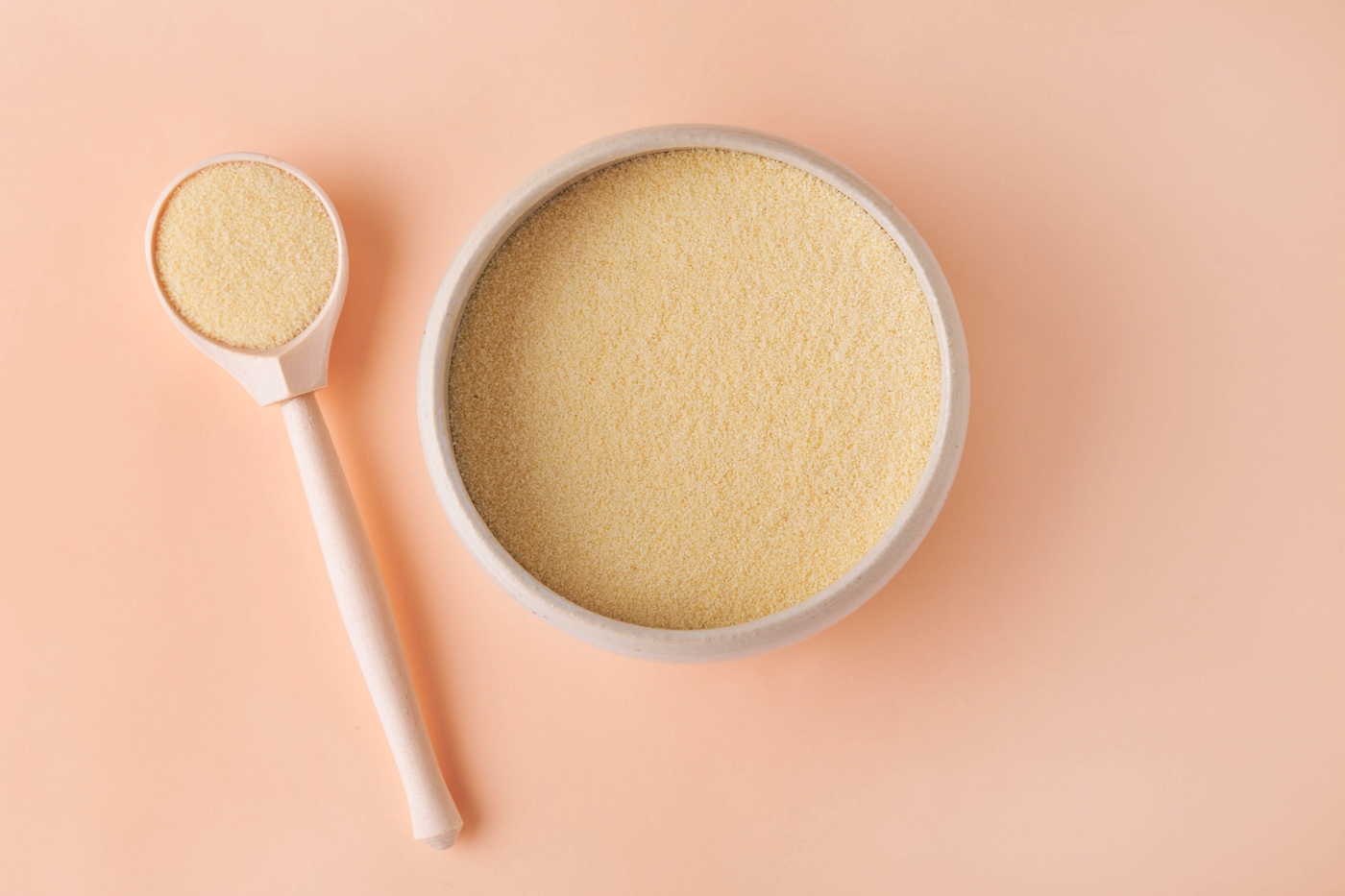

Featured
What Food Is Good For Gut Health
Modified: January 2, 2024
Discover the featured food options that promote a healthy gut and improve digestion. Enhance your gut health with these nutritious and delicious choices.
Introduction
Gut health is a topic that is gaining increasing attention in the health and wellness community. The gut, also known as the gastrointestinal tract, plays a crucial role in our overall well-being. It is responsible for breaking down food, absorbing nutrients, and eliminating waste. But did you know that the health of our gut also affects other aspects of our health, including our immune system, brain function, and even our mood?
Our gut is home to trillions of bacteria, known as the gut microbiota, that coexist with our bodies in a symbiotic relationship. These beneficial bacteria help maintain a healthy digestive system, produce essential vitamins, and protect against harmful pathogens.
Unfortunately, factors such as poor diet, stress, lack of sleep, and certain medications can disrupt the balance of our gut microbiota, leading to digestive issues, inflammation, and a weakened immune system. That’s why it’s crucial to take steps to support and nourish our gut health.
In this article, we will explore the importance of gut health and the factors that can affect it. We will also discuss various foods that promote gut health and those that should be avoided. By incorporating these foods into your diet, you can optimize your gut health and overall well-being.
The Importance of Gut Health
Gut health plays a vital role in our overall well-being, affecting not only our digestion but also various aspects of our health. A healthy gut is essential for optimal nutrient absorption, a robust immune system, and even mental well-being. Let’s delve into some key reasons why gut health is so important:
1. Digestion and Nutrient Absorption: The gut is responsible for breaking down the food we eat and absorbing nutrients into the bloodstream. Poor gut health can lead to digestive issues such as bloating, diarrhea, or constipation, and hinder the absorption of vital nutrients, leading to nutrient deficiencies.
2. Immune System Strength: About 70-80% of our immune system resides in the gut. A healthy gut microbiota helps to regulate and support immune function, protecting against harmful pathogens and reducing the risk of infections, allergies, and autoimmune diseases.
3. Mental Health and Brain Function: The gut-brain connection is a bidirectional communication system between the gut and the brain. The gut microbiota produces neurotransmitters like serotonin, which plays a crucial role in regulating mood and mental well-being. Poor gut health has been linked to an increased risk of mental health disorders such as anxiety and depression.
4. Inflammation and Chronic Diseases: Chronic inflammation in the gut can trigger an immune response that spreads throughout the body, leading to systemic inflammation. This chronic inflammation has been linked to a variety of conditions such as obesity, type 2 diabetes, heart disease, and certain types of cancer.
5. Hormonal Balance: Our gut microbiota plays a role in metabolizing hormones, including estrogen, testosterone, and thyroid hormones. Imbalances in gut bacteria can disrupt hormone levels and contribute to hormonal disorders like polycystic ovary syndrome (PCOS) and hormonal acne.
Given the significant impact the gut has on multiple aspects of our health, it’s crucial to prioritize our gut health. By adopting habits that promote a healthy gut, we can enjoy improved digestion, a stronger immune system, enhanced mental well-being, and a reduced risk of chronic diseases.
Factors Affecting Gut Health
Several factors can influence the health of our gut and the balance of our gut microbiota. Understanding these factors is essential for optimizing gut health and maintaining overall well-being. Let’s explore some key factors that can impact gut health:
1. Diet: The foods we eat have a significant impact on our gut health. A diet high in processed foods, refined sugars, and unhealthy fats can disrupt the balance of gut microbiota and promote the growth of harmful bacteria. On the other hand, a diet rich in fiber, antioxidants, and prebiotics can support the growth of beneficial bacteria and promote a healthy gut.
2. Stress: Chronic stress is known to have a negative impact on gut health. It can disrupt the balance of gut microbiota, weaken the gut lining, and affect digestion. Additionally, stress can impair the gut-brain communication, leading to symptoms like abdominal pain, bloating, and changes in bowel movements.
3. Medications: Certain medications, such as antibiotics, can disrupt the natural balance of gut bacteria by killing both harmful and beneficial bacteria. This disruption can lead to digestive issues and an increased risk of infections. Other medications, like non-steroidal anti-inflammatory drugs (NSAIDs), can irritate the gut lining and contribute to gut inflammation.
4. Lack of Sleep: Poor sleep quality and inadequate sleep have been associated with an imbalance in gut bacteria and increased levels of inflammation in the gut. Sleep disruption can also affect the integrity of the gut lining and impair digestion and nutrient absorption.
5. Environmental Factors: Environmental factors such as pollution, exposure to toxins, and a lack of exposure to natural environments and beneficial microbes can impact gut health. These factors can disrupt the diversity and balance of gut microbiota and contribute to gut inflammation and digestive problems.
6. Chronic Illnesses: Certain chronic illnesses, such as inflammatory bowel disease (IBD), celiac disease, and irritable bowel syndrome (IBS), can negatively affect gut health. These conditions can lead to chronic inflammation, damage to the gut lining, and alterations in gut microbiota composition.
7. Age and Genetics: Age and genetics also play a role in gut health. As we age, the diversity and abundance of gut bacteria tend to decline. Genetic factors can influence our susceptibility to certain gut conditions and affect how we respond to dietary and environmental factors.
By being mindful of these factors and taking steps to address them, such as adopting a healthy diet, managing stress, getting quality sleep, and avoiding unnecessary medications, we can promote a healthy gut and support overall well-being.
Foods That Promote Gut Health
When it comes to promoting gut health, the foods we choose to eat can have a significant impact. Incorporating certain foods into our diet can help nourish and support the growth of beneficial gut bacteria, reduce inflammation, and enhance digestion. Here are seven types of foods that are particularly beneficial for gut health:
- High-Fiber Foods: Fiber-rich foods are excellent for promoting gut health. They act as prebiotics, which serve as food for beneficial bacteria in the gut. Include plenty of fruits, vegetables, legumes, and whole grains in your diet to ensure an adequate intake of fiber.
- Fermented Foods: Fermented foods contain live bacteria that can introduce beneficial microorganisms into the gut. These foods include yogurt, kefir, sauerkraut, kimchi, and tempeh. Regularly consuming fermented foods can help enhance gut microbiota diversity and improve digestion.
- Prebiotic-Rich Foods: Prebiotics are a type of fiber that cannot be digested by the body but serves as fuel for beneficial gut bacteria. Foods rich in prebiotics include onions, garlic, leeks, asparagus, bananas, and chicory root. Incorporating these foods into your diet can promote the growth of good bacteria in the gut.
- Omega-3 Fatty Acid Sources: Foods rich in omega-3 fatty acids, such as fatty fish (salmon, mackerel, sardines), flaxseeds, chia seeds, and walnuts, have anti-inflammatory properties and can help reduce gut inflammation. Including these sources of omega-3s in your diet can support a healthy gut.
- Antioxidant-Rich Foods: Antioxidants help reduce oxidative stress and inflammation in the body, including the gut. Include a variety of colorful fruits and vegetables, such as berries, leafy greens, bell peppers, and tomatoes, to supply your body with a range of antioxidants.
- Bone Broth: Bone broth is rich in collagen, gelatin, and amino acids that support the gut lining, reduce inflammation, and promote gut healing. Homemade bone broth from grass-fed or organic sources is the best option.
- Probiotic Supplements: In addition to naturally occurring probiotic-rich foods, taking probiotic supplements can provide a concentrated source of beneficial bacteria. Look for high-quality probiotic supplements containing a variety of strains that are known to support gut health.
Incorporating these gut-friendly foods into your diet can help support a healthy gut microbiota, enhance digestion, reduce inflammation, and promote overall well-being.
High-Fiber Foods
High-fiber foods are essential for promoting gut health and maintaining a healthy digestive system. Fiber is a type of carbohydrate that our bodies are unable to digest, but it plays a crucial role in keeping our gut microbiota happy and healthy. Here are some reasons why including high-fiber foods in your diet is beneficial for gut health:
- Improved Digestion: Fiber adds bulk to our stool, making it easier to pass through the digestive system. This helps prevent constipation and promotes regular bowel movements.
- Support for Beneficial Gut Bacteria: High-fiber foods act as prebiotics, which serve as a food source for beneficial gut bacteria. These bacteria ferment the fiber and produce short-chain fatty acids (SCFAs), which help nourish the cells lining the gut and support overall gut health.
- Enhanced Nutrient Absorption: Fiber helps slow down the digestion process, allowing for better absorption of nutrients in the small intestine.
- Weight Management: High-fiber foods are more filling and can help control appetite, promoting healthy weight management.
- Blood Sugar Regulation: Fiber slows down the absorption of sugar into the bloodstream, which helps stabilize blood sugar levels and can be beneficial for individuals with diabetes or insulin resistance.
- Reduced Risk of Chronic Diseases: High-fiber diets have been associated with a lower risk of developing various chronic diseases, including heart disease, obesity, and certain types of cancer.
So, what are some examples of high-fiber foods? Include a variety of whole grains, such as oats, quinoa, and brown rice, as well as fruits and vegetables like berries, apples, broccoli, and Brussels sprouts. Legumes like beans, lentils, and chickpeas are also excellent sources of fiber. Aim to gradually increase your fiber intake and ensure you’re drinking plenty of water to help with digestion.
Remember that too much fiber too quickly can cause digestive discomfort, so it’s best to increase your intake gradually and listen to your body’s signals. Aim for around 25-30 grams of fiber per day, but consult with a healthcare professional if you have specific dietary needs or conditions that require adjustments to your fiber intake.
By including high-fiber foods in your diet, you can support a thriving gut microbiota, promote healthy digestion, and reduce the risk of various chronic diseases.
Fermented Foods
Fermented foods have been consumed by various cultures for centuries and are known for their beneficial effects on gut health. These foods undergo a natural fermentation process, where beneficial bacteria, yeasts, or molds convert sugars and carbohydrates into organic acids or alcohol. Incorporating fermented foods into your diet can introduce live microorganisms into your gut, providing a range of benefits for your digestive system and overall well-being. Here’s why fermented foods are beneficial for gut health:
- Increased Probiotic Content: Fermented foods are rich in probiotics, which are live microorganisms that confer health benefits to the host when consumed in adequate amounts. These probiotics can help replenish and enhance the diversity of beneficial gut bacteria.
- Improved Digestion: The fermentation process breaks down complex carbohydrates and proteins in food, making them easier to digest. This can help alleviate symptoms of digestive issues like bloating, gas, and indigestion.
- Enhanced Nutrient Absorption: Fermentation can increase the bioavailability of nutrients, allowing for better absorption of vitamins, minerals, and other essential nutrients by the body.
- Immune System Support: The gut is closely connected to the immune system, and consuming fermented foods can help promote a healthy immune response. The beneficial bacteria in fermented foods stimulate the production of antibodies and improve gut barrier function, reducing the risk of infections and autoimmune disorders.
- Reduced Inflammation: Fermented foods contain beneficial bacteria that produce anti-inflammatory compounds, such as short-chain fatty acids, which can help reduce gut inflammation and alleviate symptoms of inflammatory conditions like inflammatory bowel disease (IBD).
- Mood and Mental Health: Emerging research indicates a strong connection between the gut and the brain, known as the gut-brain axis. Consuming fermented foods may positively impact mental health by influencing the production of neurotransmitters and reducing symptoms of anxiety and depression.
Some common examples of fermented foods include yogurt, kefir, sauerkraut, kimchi, tempeh, miso, and kombucha. When selecting fermented foods, opt for varieties that are naturally fermented and unpasteurized to ensure they contain live cultures. Incorporate a variety of fermented foods into your diet to introduce different strains of beneficial bacteria and maximize the benefits.
Keep in mind that while fermented foods are generally safe for most people, those with certain health conditions or compromised immune systems should exercise caution and consult with a healthcare professional before making significant changes to their diet.
By regularly incorporating fermented foods into your diet, you can introduce beneficial bacteria into your gut, support digestion, boost your immune system, and positively impact your overall gut and mental health.
Prebiotic-Rich Foods
Prebiotics are non-digestible fibers that serve as food for the beneficial bacteria living in our gut. These fibers pass through the small intestine undigested and reach the colon, where they are fermented by the gut microbiota. Including prebiotic-rich foods in your diet can help nourish and promote the growth of beneficial gut bacteria, leading to a healthier gut microbiome. Here are the reasons why consuming prebiotic-rich foods is important for gut health:
- Support for Beneficial Gut Bacteria: Prebiotics serve as a source of energy for the beneficial bacteria in the gut. By consuming prebiotic-rich foods, you can selectively promote the growth of these beneficial bacteria, enhancing their population in your gut microbiome.
- Improved Digestive Health: Prebiotics help maintain regular bowel movements and promote a healthy digestive system. They can aid in reducing constipation and improving overall bowel regularity.
- Enhanced Nutrient Absorption: By supporting a healthy population of beneficial gut bacteria, prebiotics can improve the absorption of essential nutrients, such as calcium and magnesium, in the gut.
- Reduced Inflammation: Prebiotics play a role in reducing gut inflammation by promoting the production of short-chain fatty acids (SCFAs). SCFAs like butyrate have anti-inflammatory effects on the gut lining and help maintain its integrity.
- Weight Management: Consuming prebiotic-rich foods can aid in weight management. Prebiotics increase feelings of fullness and reduce hunger hormone levels, helping to control appetite and prevent overeating.
- Blood Sugar Regulation: Prebiotics have been shown to improve insulin sensitivity and help regulate blood sugar levels. Including prebiotic-rich foods in your diet can be beneficial for individuals with diabetes or those at risk of developing it.
- Boosted Immune System: A healthy gut microbiota is closely linked to a strong immune system. By nourishing the beneficial bacteria in your gut, prebiotics help support immune function and reduce the risk of infections.
Some examples of prebiotic-rich foods include onions, garlic, leeks, asparagus, bananas, chicory root, Jerusalem artichoke, and oats. Incorporating these foods into your meals can provide the necessary prebiotic fibers to support gut health. It’s important to note that cooking can reduce the prebiotic content in some foods, so consider incorporating raw or lightly cooked options whenever possible.
Gradually introducing prebiotic-rich foods into your diet can help minimize any digestive discomfort that may arise. As different prebiotics may have varying effects on individuals, it’s best to experiment with a variety of foods to determine which ones work best for you.
By regularly consuming prebiotic-rich foods, you can provide your gut bacteria with the nourishment they need, optimize the balance of your gut microbiome, and support overall gut health.
Omega-3 Fatty Acid Sources
Omega-3 fatty acids are a type of polyunsaturated fat that plays a crucial role in maintaining gut health. These essential fatty acids are not naturally produced by the body, so it’s important to obtain them through our diet. Omega-3 fatty acids have numerous benefits for gut health and overall well-being. Here’s why incorporating omega-3 fatty acid sources into your diet is important:
- Reduced Inflammation in the Gut: Omega-3 fatty acids have anti-inflammatory properties, which can help to alleviate inflammation in the gut. Chronic inflammation in the gut can lead to a variety of digestive disorders, such as inflammatory bowel disease (IBD) and irritable bowel syndrome (IBS).
- Improved Gut Lining Integrity: Omega-3 fatty acids help to maintain the integrity of the gut lining, preventing the entry of harmful substances into the bloodstream. A healthy gut lining is essential for optimal digestion and nutrient absorption.
- Enhanced Gut Microbiota Composition: Omega-3 fatty acids can positively influence the composition of the gut microbiota. They promote the growth of beneficial bacteria, such as Bifidobacteria and Lactobacillus, while inhibiting the growth of harmful bacteria.
- Regulated Bowel Movements: Omega-3 fatty acids can help regulate bowel movements and alleviate symptoms of constipation. They promote healthy gut motility, ensuring the smooth passage of stool through the digestive tract.
- Cardiovascular Health Benefits: In addition to their benefits for gut health, omega-3 fatty acids are known to support cardiovascular health. They help reduce blood triglyceride levels, lower blood pressure, and improve overall heart health.
- Brain Function and Mental Health: Omega-3 fatty acids are essential for brain health and cognitive function. They have been linked to a reduced risk of cognitive decline, depression, and anxiety disorders.
- Sources of Omega-3 Fatty Acids: Fatty fish like salmon, mackerel, sardines, and trout are excellent sources of omega-3 fatty acids. Vegetarian sources include flaxseeds, chia seeds, walnuts, and hemp seeds. Omega-3 supplements, such as fish oil or algae oil, can also be considered if dietary sources are limited.
To incorporate more omega-3 fatty acids into your diet, aim to include fatty fish in your meals at least two to three times a week. If you follow a vegetarian or vegan diet, focus on incorporating plant-based sources of omega-3 fatty acids into your meals regularly.
Remember that omega-3 fatty acids should be consumed as part of a balanced diet and lifestyle. Consulting with a healthcare professional or a registered dietitian can help you determine the appropriate dosage or dietary changes you may need based on your specific health condition or individual needs.
By including omega-3 fatty acid sources in your diet, you can support gut health, reduce inflammation, promote a healthy gut microbiota, and enjoy numerous other health benefits.
Antioxidant-Rich Foods
Antioxidants are compounds found in various foods that help protect our cells from damage caused by free radicals, which are unstable molecules that can cause oxidative stress in the body. Including antioxidant-rich foods in your diet not only benefits overall health but also supports gut health. Here are the reasons why consuming antioxidant-rich foods is important for maintaining a healthy gut:
- Reduced Oxidative Stress: Oxidative stress in the gut can lead to inflammation and damage to the gut lining. Antioxidants help neutralize free radicals, reducing oxidative stress and promoting a healthy gut environment.
- Improved Gut Barrier Function: Antioxidants play a role in strengthening the gut barrier, which prevents the entry of harmful substances and toxins into the bloodstream. A strong gut barrier enhances digestion and nutrient absorption while reducing the risk of gut-related disorders.
- Reduced Inflammation in the Gut: Chronic inflammation in the gut can disrupt the balance of gut bacteria and contribute to digestive issues. Antioxidant-rich foods have anti-inflammatory properties that can help reduce gut inflammation and alleviate symptoms of conditions such as inflammatory bowel disease (IBD) and irritable bowel syndrome (IBS).
- Protection against Gut Diseases: Antioxidants, such as polyphenols and flavonoids, have been shown to have protective effects against various gut-related diseases, including colorectal cancer and gastric ulcers.
- Enhanced Immune Function: A healthy gut is closely connected to a strong immune system. Antioxidants can support immune function by reducing oxidative stress and inflammation, promoting optimal functioning of the immune response in the gut.
- Food Sources of Antioxidants: Some excellent sources of antioxidants include berries (such as blueberries, strawberries, and raspberries), leafy green vegetables, dark chocolate, nuts (such as walnuts and almonds), green tea, turmeric, and colorful fruits and vegetables.
Incorporating a variety of antioxidant-rich foods into your diet is essential for reaping their benefits. Aim to include these foods in your meals and snacks regularly to support gut health and overall well-being.
Remember that a diet rich in antioxidants should be part of a well-balanced and diverse dietary pattern. Consuming a variety of colorful fruits, vegetables, whole grains, and other plant-based foods will provide you with an array of different antioxidants and other essential nutrients.
Lastly, it’s important to note that while antioxidants have numerous health benefits, taking excessive antioxidant supplements may not provide additional benefits and may even have adverse effects. It’s best to obtain antioxidants from natural food sources as part of a wholesome diet.
By incorporating antioxidant-rich foods into your diet, you can protect your gut from oxidative stress, promote gut barrier function, reduce inflammation, and support overall gut health.
Bone Broth
Bone broth is a nutrient-rich liquid made by simmering animal bones (such as chicken, beef, or fish) with water and various herbs and vegetables. This ancient and traditional food has gained popularity for its potential health benefits, particularly for gut health. Here’s why incorporating bone broth into your diet can be beneficial for your gut:
- Soothing and Healing Properties: Bone broth contains gelatin, collagen, and amino acids like glutamine, which have been shown to support the healing and repair of the gut lining. This can be especially helpful for individuals with gut-related disorders like leaky gut syndrome or inflammatory bowel disease (IBD).
- Support for Gut Microbiota: The gelatin and other compounds in bone broth act as a source of nutrients for the beneficial bacteria in your gut. This helps promote the growth of these beneficial bacteria and supports a healthy gut microbiota.
- Improved Digestion and Nutrient Absorption: The amino acids and gelatin in bone broth help enhance digestion and improve nutrient absorption. This can be beneficial for individuals with digestive issues, such as irritable bowel syndrome (IBS) or malabsorption disorders.
- Reduction of Inflammation and Pain: The amino acids in bone broth, particularly glycine, have anti-inflammatory properties that can help reduce gut inflammation and alleviate symptoms of inflammatory gut conditions, such as ulcerative colitis or Crohn’s disease.
- Joint and Bone Health: Bone broth is rich in minerals like calcium, magnesium, and phosphorus, which are essential for maintaining strong bones and healthy joints.
- Easy to Digest: The long, slow cooking process used to make bone broth helps break down the nutrients and proteins, making it easier to digest compared to other types of food.
To make bone broth, you can use leftover bones from roasted or cooked meats, or purchase high-quality bones from a butcher or farmer’s market. Simmer the bones with water for several hours, along with herbs, vegetables, and spices of your choice, to extract the nutrients and flavors. You can enjoy bone broth as a warm drink on its own, or use it as a base for soups, stews, or other recipes.
While bone broth is generally safe for most individuals, it’s important to ensure that the bones come from high-quality and organic sources to minimize the intake of any harmful substances. If you have any specific dietary concerns or health conditions, it’s best to consult with a healthcare professional before incorporating bone broth into your diet.
By including bone broth in your diet, you can reap the potential benefits of its gut-soothing properties, support a healthy gut microbiota, reduce inflammation, and promote overall gut health.
Probiotic Supplements
Probiotics are live microorganisms that provide several health benefits when consumed in adequate amounts. While probiotics can be found naturally in fermented foods, such as yogurt, kefir, and sauerkraut, some individuals may choose to supplement their diet with probiotics to support gut health. Here’s why incorporating probiotic supplements into your routine can be beneficial:
- Support for Beneficial Gut Bacteria: Probiotic supplements contain specific strains of beneficial bacteria that can help restore or improve the balance of gut microbiota. They can be particularly beneficial following a course of antibiotics, which can disrupt the gut flora.
- Improved Digestion: Probiotics can help regulate bowel movements and alleviate symptoms of digestive issues, such as bloating, gas, and diarrhea. They work by promoting a healthy balance of bacteria in the gut and enhancing overall gut function.
- Boosted Immune System: A significant portion of our immune system resides in the gut. Probiotics help strengthen the gut’s immune response by promoting the production of antibodies and enhancing the functionality of immune cells.
- Reduced Risk of Infections: Probiotics can help protect against harmful bacteria and pathogens by competing for space and resources in the gut. They can also produce antimicrobial compounds that inhibit the growth of harmful microorganisms.
- Management of Irritable Bowel Syndrome (IBS): Some strains of probiotics, such as Bifidobacterium and Lactobacillus, have been found to be beneficial in alleviating symptoms of IBS, including abdominal pain, bloating, and changes in bowel movements.
- Improved Mental Well-being: Emerging evidence suggests a strong connection between gut health and mental health. Probiotics may positively influence mood and mental well-being by modulating the gut-brain axis and affecting neurotransmitter production.
- Choosing Probiotic Supplements: Look for high-quality probiotic supplements that contain specific strains of bacteria, such as Lactobacillus acidophilus, Bifidobacterium lactis, or Saccharomyces boulardii, supported by scientific research. It’s also important to consider the dosage and storage requirements as different strains and brands may have varying recommendations.
While probiotic supplements can be beneficial, it’s important to note that not all probiotic supplements are created equal. The effectiveness of probiotics depends on various factors, including the specific strains, dosage, and individual response. It’s recommended to consult with a healthcare professional or a registered dietitian to determine the most suitable probiotic supplement and dosage for your specific needs.
Additionally, it’s essential to remember that probiotic supplements should not replace a healthy, varied diet. They should be seen as a complementary measure to support gut health and not as a standalone solution.
By incorporating probiotic supplements into your diet, you can introduce beneficial bacteria into your gut, support digestion, enhance immune function, and potentially enjoy numerous other health benefits.
Foods to Avoid for Gut Health
While incorporating gut-friendly foods into your diet is important, it’s equally crucial to be aware of foods that can negatively impact gut health. Certain foods, particularly those high in sugar, processed ingredients, and unhealthy fats, can disrupt the balance of gut microbiota, promote inflammation, and contribute to digestive issues. Here are some foods to limit or avoid for the sake of gut health:
- Sugary Foods and Beverages: Excessive consumption of sugary foods and beverages can feed harmful gut bacteria and lead to imbalances in gut microbiota. This includes high-sugar snacks, sodas, candies, and sweetened desserts.
- Processed Foods: Processed foods, such as packaged snacks, fast food, frozen meals, and sugary cereals, tend to be low in nutrients and high in unhealthy fats, refined grains, and artificial additives. These can disrupt gut health and contribute to inflammation.
- Artificial Sweeteners: Artificial sweeteners, found in many diet sodas, sugar-free desserts, and low-calorie products, can negatively affect gut health. They may alter the composition of gut bacteria and lead to imbalances in the microbiota.
- Refined Grains: Refined grains, such as white bread, white rice, and refined pasta, have been stripped of their natural fiber and nutrients. They can cause a rapid rise in blood sugar levels, promote inflammation, and negatively impact gut health.
- High-Saturated and Trans Fats: Foods high in saturated and trans fats, including fried foods, processed meats, and commercially baked goods, can contribute to gut inflammation, impair digestion, and increase the risk of conditions like heart disease and obesity.
- Alcohol: Excessive alcohol consumption can damage the gut lining, disrupt gut microbiota, and lead to inflammation and digestive issues. Moderate alcohol consumption is generally considered less harmful, but it’s best to be mindful of your intake.
- Artificial Additives: Many processed foods, such as artificial food dyes, preservatives, and emulsifiers, can be detrimental to gut health. These additives may disrupt the gut microbiota and contribute to digestive disorders.
Keep in mind that individual sensitivities and tolerances may vary. While these foods are generally best avoided or limited for gut health, it’s essential to pay attention to your body and identify any specific triggers or intolerances you may have.
Opting for a balanced and wholesome diet that includes a variety of whole foods, such as fruits, vegetables, legumes, whole grains, lean proteins, and healthy fats, is key to maintaining good gut health. Minimizing the consumption of processed and unhealthy foods while incorporating gut-friendly options will contribute to a healthier gut and overall well-being.
Conclusion
Gut health is a fundamental aspect of our overall well-being, impacting various facets of our health, from digestion to immune function, and even mental health. By understanding the importance of gut health and implementing habits that support it, we can optimize our overall wellness.
In this article, we explored the significance of gut health and discussed various factors that can affect it, including diet, stress, medications, lack of sleep, and environmental factors. We also delved into the benefits of consuming foods that promote gut health, such as high-fiber foods, fermented foods, prebiotic-rich foods, omega-3 fatty acids, antioxidant-rich foods, bone broth, and probiotic supplements.
On the other hand, it’s crucial to be aware of foods that can compromise gut health. Limiting or avoiding sugary foods, processed foods, artificial sweeteners, refined grains, unhealthy fats, alcohol, and artificial additives can help maintain a healthy gut environment.
Remember, achieving and maintaining gut health is an ongoing process. It may require experimentation and adjustments to find the best approach that suits your individual needs. It is always a good idea to consult with a healthcare professional or a registered dietitian for personalized guidance and recommendations.
By prioritizing gut health through our dietary and lifestyle choices, we can support a thriving gut microbiota, alleviate digestive issues, strengthen our immune system, enhance mental well-being, and reduce the risk of chronic diseases. Nurturing a healthy gut is a key step towards achieving optimal health and enjoying a vibrant and fulfilling life.









